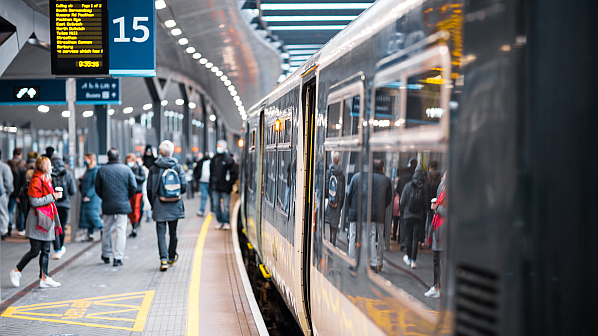THE rise of the Omicron variant of Covid-19 is beginning to have an impact on passenger train operations, with delays to the introduction of new timetables, increasing number of face covering requirements and cancellation of services.
Netherlands Railways (NS) confirmed that from December 20 it would operate fewer trains in the evening, night and rush hour, and that the usual evening timetable would commence two hours earlier than usual. NS says passenger numbers in the evening have dropped following the Dutch government’s tightening of restrictions to curb the outbreak of the virus. NS says that before the new evening lockdown there was around 55% of pre-pandemic passenger numbers, but this has since dropped to 40%.
Belgian National Railways (SNCB) took the decision at the start of December to cancel around 100 of its 3800 daily trains due to rising staff illness or quarantine. The aim is to offer passengers a transparent timetable rather than cancellations. This affected both commuter and inter-city services. When the decision was made, SNCB said that passenger numbers had risen to around 80% of pre-Covid levels, but this had begun to decline, and had dropped to 70% by the start of the month.
The French government announced that anyone aged 12 and over entering one of its territories must present a negative PCR or antigen test of less than 24 or 48 hours depending on the country of origin. Strict regulations on who could travel from Britain to France have been introduced, affecting cross-Channel operator Eurostar, which had reported an upturn in ridership and service frequency prior to the latest restrictions.
In Britain, operators are encouraging the use of face masks. However, thousands of trains were reportedly being cancelled each day due to staff shortages caused by the pandemic. This situation was expected to worsen over the Christmas period. In Wales, an emergency timetable was introduced to combat an expected rise in staff shortages with around 10-15% of all services cancelled. TfW Rail said the situation would be regularly reviewed.
Austrian Federal Railways (ÖBB) was one of the first affected by the latest outbreak. However while Austria has entered a full lockdown, rail services continued operating with no planned reduction.
Coronavirus passes were introduced by Danish State Railways (DSB) following a recommendation from the Danish Epidemic Commission. Passengers without a pass were unable to travel. The measures came into effect at 08.00 on December 19 and are due to last until January 16. The government mandated the wearing of face masks on trains on November 29 after lifting all restrictions on September 13.
Norwegian authorities encouraged all passengers to wear facemasks onboard trains and indoors at stations, with social distancing also encouraged.
Finnish operator VR switched from recommending passengers should wear face coverings to enforcing the ruling from December 17.
Poland introduced a ruling that all international travellers arriving in the country from outside the European Union (EU) must provide a negative test result.
Ukraine Railways (UZ) requires passengers to only travel if they are fully vaccinated or have received at least one dose of the vaccine, and can also provide a negative PCR test result.
Outside Europe
KiwiRail has confirmed it will not restart operating two of its regular scenic trains until mid-2022 due to the pandemic and the lack of travellers due to New Zealand’s closed borders. The services have been paused since August when restrictions were reintroduced due to a rise in the number of infections.
In a statement on December 19, China Railway said that high attention must be paid to “epidemic prevention and control” during the upcoming New Year’s Day and Spring Festival celebrations. Ms Liang Wannian, head of the expert group of the National Health Commission’s Epidemic Response and Disposal Work Leading Group, said large-scale population movements will risk the spread of infection but that generally China is safe.
The number of passengers travelling in 2022 is expected to be much higher than in 2021 according to Mr Wu Shiping, deputy director of the Ministry of Labour and Health of the National Railway Group. This means the epidemic prevention and control work was facing a greater challenge. “The railway department will coordinate the prevention and control of the epidemic and the organisation of transport for the Spring Festival transport… and strictly implement various epidemic prevention and control measures, and strive to provide a safe and healthy travel environment for the majority of passengers,” Shiping says.

